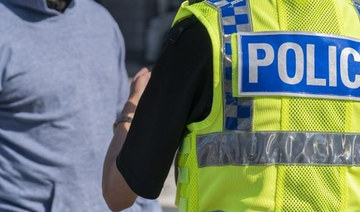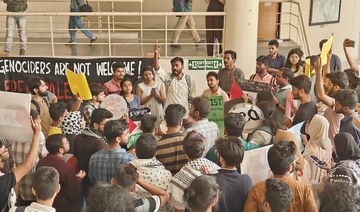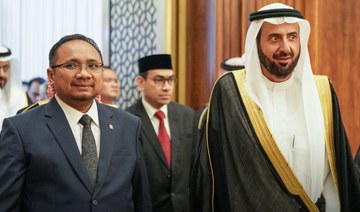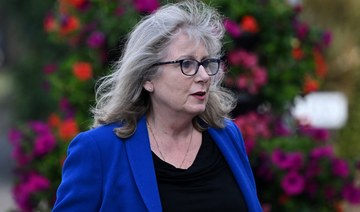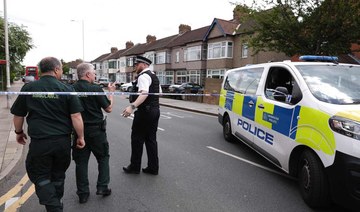PRISTINA/BELGRADE: Kosovo Foreign Minister Enver Hoxhaj said on Friday his country had retaliated against neighboring Serbia and would do so again after an ex-prime minister was arrested in France on a warrant issued by Belgrade.
The arrest on Wednesday of Ramush Haradinaj, a guerrilla commander in the 1998-99 war against Serbian rule who served briefly as prime minister in 2004 and 2005, has heightened tensions between the Balkan neighbors.
Kosovo accused Serbia of wanting to provoke “tensions and conflicts” in the Balkans, following the arrest in France of its former premier.
Belgrade accuses Haradinaj of war crimes against civilians in the late 1990s, when he led ethnic Albanian insurgents fighting Serbian forces for Kosovo’s independence.
Kosovo seceded from Serbia in 2008. Both states want to join the European Union membership but Brussels says they must normalize relations before their applications can go ahead. Kosovo opposition parties have called for their EU-mediated dialogue to be halted.
“Yesterday we took reciprocal measures with Nikolic (and) we will do that again in the future,” Hoxhaj told reporters in Pristina. “There has to be a revision of our relations with Serbia and a revision of the dialogue.”
Also on Friday, ethnic Albanian protesters in the western town of Gjakova — mostly families of those killed by Serb forces during the 1998-99 conflict — stoned a bus that was carrying ethnic Serb pilgrims marking Orthodox Christmas Eve.
Hoxhaj said Serbia had issued more international arrest warrants for Kosovo citizens, limiting their travel abroad.
Serbia does not recognize Kosovo as an independent state and together with its ally Russia is blocking Pristina’s efforts to join the United Nations and other international institutions.
Haradinaj, who appeared before a French court on Thursday, will remain in prison until Serbia makes a formal extradition order, which will then be examined by the court.
Serbia has charged Haradinaj with murdering Serbs in the late 1990s war. That conflict ended after NATO bombed Serbia for 11 weeks to compel it to withdraw forces that had killed some 10,000 members of Kosovo’s ethnic Albanian majority in counter-insurgency operations.
Thousands of Haradinaj’s party supporters gathered in front of the French Embassy in Pristina on Friday holding US and Albanian flags under heavy snow. “Do not offend Kosovo” one banner read.
The government is calling on French authorities to release the former prime minister who has been detained facing possible extradition to Serbia to face war crimes charges.
A French court Thursday ruled that Haradinaj, detained a day earlier, should stay in custody until it decides whether to turn him over to Serbian officials.
Kosovo Prime Minister Isa Mustafa on Friday urged “the French government to take into consideration that such warrants are fully political and have no legal or juridical base.”
France’s Foreign Ministry has refused to comment on Kosovo’s call for Haradinaj’s release.
Twice tried and acquitted, Haradinaj was detained on Wednesday as he arrived at the Basel-Mulhouse-Freiburg airport, located near the Swiss and German borders, under an international arrest warrant issued by Serbia’s judiciary in 2004.
At a Cabinet meeting on Friday, Kosovo’s Prime Minister Isa Mustafa expressed “the government’s concern over this arrest and the judicial proceedings.”
Belgrade’s motivations are “political and unfriendly,” Mustafa said, adding that such arrest warrants were “completely illegal and unjust” with the consequence of “provoking tensions and conflicts, and damaging the European (integration) process in the region.”
Some 13,000 people were killed in the 1998-1999 war in Kosovo, a former province of Serbia that is largely ethnic Albanian.
In 2008 Kosovo unilaterally declared independence but its sovereignty is not recognized by Belgrade or Moscow.
A European-Union brokered agreement was reached in 2013 to “normalize” relations between Belgrade and Pristina.
The normalization process is opposed by Haradinaj but backed by his former companion in arms, President Hashim Thaci.
Briefly prime minister in 2004-2005, Haradinaj now leads an opposition political party.
On Friday, several hundred war veterans protested against his arrest in front of the French embassy in Pristina, carrying banners reading: “Haradinaj is Kosovo” and “Seek criminals in Serbia.”
“We are protesting against France for carrying out Serbian arrest orders. We expect France to release him as soon as possible,” said former pro-independence fighter Binak Sylaj, 44.
On Twitter, Albanian Prime Minister Edi Rama described the arrest of Haradinaj as an “absurdity.”
The French court says it is awaiting the formal extradition request from Serbia before it sets a date for a hearing.
Haradinaj, 48, a guerrilla fighter in Kosovo’s 1998-1999 war for independence from Serbia and now an opposition political leader, is accused by Serbia of committing kidnappings, torture and killings against Serb civilians when he was a senior rebel commander in western Kosovo.
Hundreds of former Kosovo guerrilla fighters and supporters from opposition parties staged a protest outside the French embassy to call for Haradinaj’s release.
In Belgrade, Serbian Prime Minister Aleksandar Vucic on Thursday expressed hope France would extradite Haradinaj and would not let politics override legal matters.
In a message Friday on Facebook, Haradinaj deplored that France would “still respect decisions of (Slobodan) Milosevic’s former regime.”
Haradinaj was cleared of war crimes charges in two lengthy trials by a UN war crimes tribunal. Two years ago Haradinaj was detained in Slovenia at Belgrade’s request, but later released.
“I have a message for Serbia’s friends within Kosovo and abroad: Kosovo’s road to statehood cannot be stopped by anyone,” he said.
Mustafa said the government is planning to take measures if “Serbia, misusing the international law and order mechanism, continues the application of such politically unacceptable and immoral acts to Kosovo’s activists and fighters for freedom.”
Kosovo to review ties with Serbia after ex-PM’s arrest
Kosovo to review ties with Serbia after ex-PM’s arrest
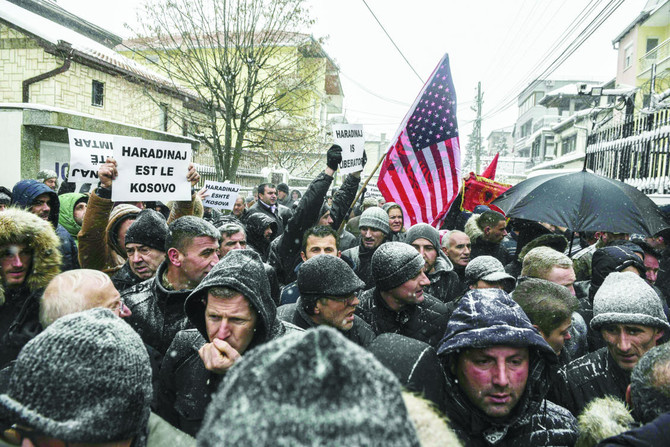
British police officer pleads guilty to terror charges for showing support for Hamas
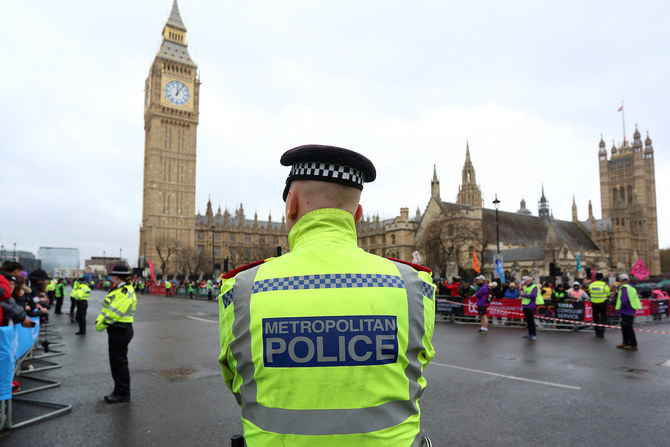
- Adil pleaded guilty in Westminster Magistrates’ Court to two counts of publishing an image in support of a proscribed organization in violation of the Terrorism Act
- Two other police officers who were concerned by the images reported Adil to superiors
LONDON: A British police officer pleaded guilty Thursday to terror charges for showing support on social media for Hamas, which is designated a terror group and banned in the UK
West Yorkshire constable Mohammed Adil admitted sharing two images on WhatsApp supporting the group three weeks after Hamas and other Palestinian militants stormed into Israel on Oct. 7 and killed about 1,200 people and seized some 250 hostages.
Adil, 26, pleaded guilty in Westminster Magistrates’ Court to two counts of publishing an image in support of a proscribed organization in violation of the Terrorism Act.
In messages shared on WhatsApp stories with nearly 1,100 contacts, Adil posted images of a fighter wearing a Hamas headband, prosecutor Bridget Fitzpatrick said.
“Today is the time for the Palestinian people to rise, set their paths straight and establish an independent Palestinian state,” an Oct. 31 post said, apparently quoting the leader of Hamas’ military wing.
A second post on Nov. 4 was said to quote a Hamas military spokesperson.
Two other police officers who were concerned by the images reported Adil to superiors, Fitzpatrick said. He was arrested in November and has been suspended from the force.
“I accept that at the time of the offending you were of good character,” Chief magistrate Paul Goldspring told Adil, though he said he may impose a prison term when he is sentenced June 4.
Adil was released on bail.
California police move in to dismantle pro-Palestinian protest camp at UCLA

- The pre-dawn police crackdown at UCLA marked the latest flashpoint for mounting tensions on US college campuses
- Live TV footage showed about six protesters under arrest
LOS ANGELES: Hundreds of helmeted police muscled their way into a central plaza of the University of California at Los Angeles early on Thursday to dismantle a pro-Palestinian protest camp attacked the previous night by pro-Israel supporters.
The pre-dawn police crackdown at UCLA marked the latest flashpoint for mounting tensions on US college campuses, where protests over Israel’s conduct of the war in Gaza have led to student clashes with each other and law enforcement.
Live TV footage showed about six protesters under arrest, kneeling on the ground, their hands bound behind their backs with zip-ties.
Dozens of loud explosions were heard during the clash from flash-bang charges, or stun grenades, fired by police.
Demonstrators, some carrying makeshift shields and umbrellas, sought to block the officers’ advance by their sheer numbers, while shouting, “push them back” and flashing bright lights in the eyes of the police. Others on the opposite side of the camp gave up quickly, and were seen walking away with their hands over their heads under police escort.
Around sunset on Wednesday, officers in tactical gear had begun filing onto the UCLA campus and taking up positions adjacent to a complex of tents occupied by throngs of demonstrators, live footage from the scene showed.
Local television station KABC-TV estimated 300 to 500 protesters were hunkered down inside the camp, while around 2,000 more had gathered outside the barricades in support.
But the assembled police stood by on the periphery for hours before finally starting to force their way into the encampment around 3:15 a.m. PDT (1015 GMT), tearing down barricades and arresting occupants who refused to leave. The raid was led by a phalanx of California Highway Patrol officers carrying shields and batons.
Some of the protesters had been seen donning hard hats, goggles and respirator masks in anticipation of the siege a day after the university declared the encampment unlawful.
Prior to moving in, police urged demonstrators in repeated loudspeaker announcements to clear the protest zone, which occupied a plaza about the size of a football field between the landmark twin-tower auditorium Royce Hall and the main undergraduate library.
An initial group of Los Angeles police officers who briefly entered a corner of the camp were overwhelmed by demonstrators and forced to retreat, before reinforcements arrived by the busload about an hour later.
Violent clash precedes crackdown
UCLA had canceled classes for the day on Wednesday following a violent clash between the encampment’s occupants and a group of masked counter-demonstrators who mounted a surprise assault late Tuesday night on the tent city.
The occupants of the outdoor protest camp, set up last week, had remained mostly peaceful before the melee, in which both sides traded blows and doused each other with pepper spray.
Members of the pro-Palestinian group said fireworks were thrown at them and they were beaten with bats and sticks. University officials blamed the disturbance on “instigators” and vowed an investigation.
The confrontation went on for two or three hours into early Wednesday morning before police restored order. A spokesperson for California Governor Gavin Newsom later criticized the “limited and delayed campus law enforcement response” to the unrest as “unacceptable.”
As the much-expanded police force entered the campus on Wednesday night to clear the encampment, some of the protesters were heard yelling at them, “Where were you yesterday?“
Taylor Gee, a 30-year old pro-Palestinian protester and UCLA law student, said the police action felt “especially galling” to many protesters given the slow police response a night earlier.
“For them to come out the next night to remove us from the encampment, it doesn’t make any sense, but it also makes all the sense in the world.”
Protests at schools across the US
UCLA officials said the campus, which enrolls nearly 52,000 students, including undergraduates and graduate scholars, would remain shuttered except for limited operations on Thursday and Friday.
The protests follow the Oct. 7 attack on southern Israel by Hamas militants from the Gaza Strip and the ensuing Israeli offensive on the Palestinian enclave.
Students have rallied or set up tent encampments at dozens of schools across the US in recent days, calling for an immediate ceasefire in Gaza and demanding schools divest from companies that support Israel’s government. Many of the schools have called in police to quell the protests.
The demonstrations across the country have been met with counter-protesters accusing them of fomenting anti-Jewish hatred. The pro-Palestinian side, including Jews opposed to Israeli actions in Gaza, say they are being unfairly branded as antisemitic for criticizing Israel’s government and expressing support for human rights.
The issue has taken on political overtones in the run-up to the US presidential election in November, with Republicans accusing some university administrators of turning a blind eye to antisemitic rhetoric and harassment.
Wednesday night’s police action came a day after police in New York City arrested pro-Palestinian activists who occupied a building at Columbia University and removed a tent city from the campus of the Ivy League school.
Police arrested a total of about 300 people at Columbia and City College of New York, Mayor Eric Adams said. Many of those arrested were charged with trespassing and criminal mischief.
The clashes at UCLA and in New York were part of the biggest outpouring of US student activism since the anti-racism rallies and marches of 2020.
Ninety pro-Palestinian demonstrators — students and outsiders — were arrested at Dartmouth University in New Hampshire on Wednesday, the Hanover Police Department said. They were charged with criminal trespass and resisting arrest.
Indonesia explores opportunities in Suez Canal Economic Zone

- Egypt is Indonesia’s top trade partner in the North African region
- Indonesia has lately been increasing trade engagement with Egypt
JAKARTA: Indonesia is setting its sights on cooperation with the Suez Canal Economic Zone, authorities have said after a series of ministerial-level meetings in Cairo this week.
An Indonesian delegation led by Deputy Trade Minister Jerry Sambuaga met with officials from the Suez Canal Economic Zone on Sunday to explore opportunities, as Jakarta seeks to boost exports through the vital waterway that is the shortest route between Asia and Europe.
Closer cooperation with the Suez Canal Economic Zone would help Indonesia boost its exports to Egypt, as well as other parts of Africa, the Middle East, Europe and Central Asia, Sambuaga said.
“This is in keeping with the fact that more than 8 percent of global trade goes through the Suez Canal annually … We hope that in the future, Indonesia and Egypt will have stronger cooperation and we will see an increase in the export of Indonesian goods to Egypt,” the minister added.
Southeast Asia’s biggest economy has been increasing its trade engagement with Egypt, which it sees as a gateway for exports to other African countries.
Sambuaga’s trip to Cairo followed the visit of Trade Minister Zulkifli Hasan just last year, when he signed a memorandum of understanding with Egyptian Minister of Trade and Industry Ahmed Samir to form a joint trade committee to boost commercial relations.
Earlier in March, Indonesia worked alongside Malaysia to explore the possibilities of a free trade pact between the Association of Southeast Asian Nations and Egypt.
Egypt ranks third among Indonesia’s top export destinations in the Middle East and North Africa, just after the UAE and Saudi Arabia.
With bilateral trade volume worth around $1.58 billion in 2023, Egypt is Indonesia’s top trade partner in North Africa alone. Palm oil, coffee beans, and coconut oil are some of Indonesia’s main exports to Egypt.
India, UAE mark two years of free trade with 16% growth

- Technology, innovation, and energy are main drivers behind the growth
- UAE ambassador welcomes increase in trade as ‘resounding success story’
NEW DELHI: A broad trade and investment pact signed by India and the UAE two years ago has boosted bilateral trade by 16 percent, with India’s top business body seeing growth, especially in the innovation, energy and technology sectors.
The Comprehensive Economic Partnership Agreement was signed by India’s Commerce and Industry Minister Piyush Goyal and UAE Economy Minister Abdulla bin Touq Al-Marri in February 2022.
It has been in effect since May 1, 2022, reducing tariffs on about 80 percent of all goods and providing zero-duty access to 90 percent of Indian exports.
The pact has since significantly advanced bilateral exchanges, as they registered a year-on-year increase of more than 16 percent, according to data from the Federation of Indian Chambers of Commerce and Industry, India’s largest and oldest trade association.
“In the first two years of CEPA’s operation, trade between the two countries has grown remarkably by 16.41 percent, showing an increase of total trade from $72.87 billion in 2021-2022 to $84.84 billion in 2022-2023,” FICCI Secretary-General S.K. Pathak told Arab News.
“Most of this growth has been registered in energy, infrastructure and construction, technology and innovation, pharma and healthcare, tourism and cultural exchanges.”
The agreement made the UAE emerge as India’s key partner in the Gulf Cooperation Council region, with both countries expecting to increase the total value of bilateral trade in non-petroleum products to over $100 billion and trade in services to $15 billion by 2030.
Citing the “growing importance of the trade relations between the two countries,” Pathak said the FICCI had “set up an office in Dubai to work closely with industry and government and support business to achieve the full benefits of CEPA.”
Supported by the UAE and Indian governments, the UAE-India CEPA Council was also established earlier this year to enhance investment, trade ties, and the implementation of the pact’s rules.
The UAE Embassy in India celebrated the second anniversary of the agreement with members of the business community in Mumbai, India’s financial hub.
UAE Ambassador Abdulnasser Al-Shaali welcomed the growth in bilateral commercial exchanges as a “resounding success story,” solidifying the long-standing economic ties between the two countries.
“Over the past two years, we have witnessed remarkable growth in bilateral trade, a testament to the immense potential that exists when our complementary strengths are harnessed effectively,” he said during the event on Wednesday.
“The CEPA has not only opened new avenues for businesses to benefit from the bilateral partnership but has also fostered deeper integration of our economies, paving the way for increased investment flows and collaboration across diverse sectors.”
London mayor accuses MP of ‘Islamophobia and anti-Muslim hatred’

- Lee Anderson recorded claiming Sadiq Khan ‘hates this country ... our heritage, our culture’
- Anderson claims he received support from Cabinet ministers after saying Khan controlled by ‘Islamists’
LONDON: The “Islamophobia and anti-Muslim hatred” of Reform UK MP Lee Anderson is “fuelling hate crime and violent threats,” London Mayor Sadiq Khan has said in a statement.
His comments come after ITV News released a secret recording of Anderson talking to party members at an event in which he claimed Khan “hates this country ... our heritage, our culture.”
The news also follows revelations ahead of the London mayoral elections on Thursday that Conservative candidate Susan Hall has followed social media pages and groups in which other people allegedly posted racist content and abuse aimed at the Muslim mayor.
Anderson was previously deputy chair of the Conservatives, but switched parties after he was suspended by Prime Minister Rishi Sunak for claiming that Khan was under the control of “Islamists” and had “given our capital city away to his mates.”
In the ITV recording, Anderson is heard saying former Conservative colleagues had offered him support and sympathy for his words, saying senior party officials had told him “you’re saying what millions of people are thinking up and down the country.”
While not naming anyone specifically, Anderson said: “At least two Cabinet ministers contacted me to say I’d been treated poorly.”
He added: “I would never betray the confidence of my colleagues, regardless of what political party they’re in, that was sent in confidence. A lot of those people who I sit opposite are still my friends.”
Khan said: “In the past 24 hours we have seen my Tory (Conservative) mayoral opponent endorsing Facebook groups rife with antisemitism, Islamophobia and death threats against me. And now we have a former Tory party deputy chair caught on camera being racist.
“It is deeply depressing that he confirms his Islamophobia and anti-Muslim hatred was cheered on by current Tory party staff, MPs and Cabinet ministers.”
Khan added: “It’s unpatriotic to talk down modern, diverse, brilliant Britain in this way. And it has real-world consequences, fuelling hate crime and violent threats.”


